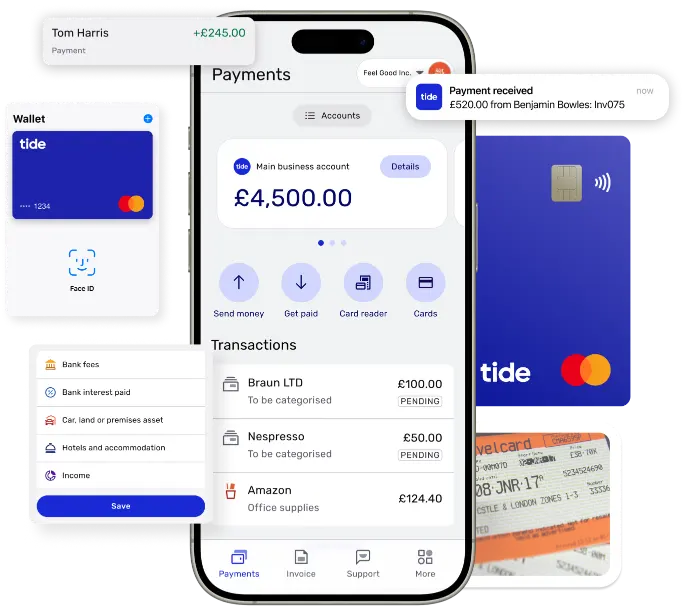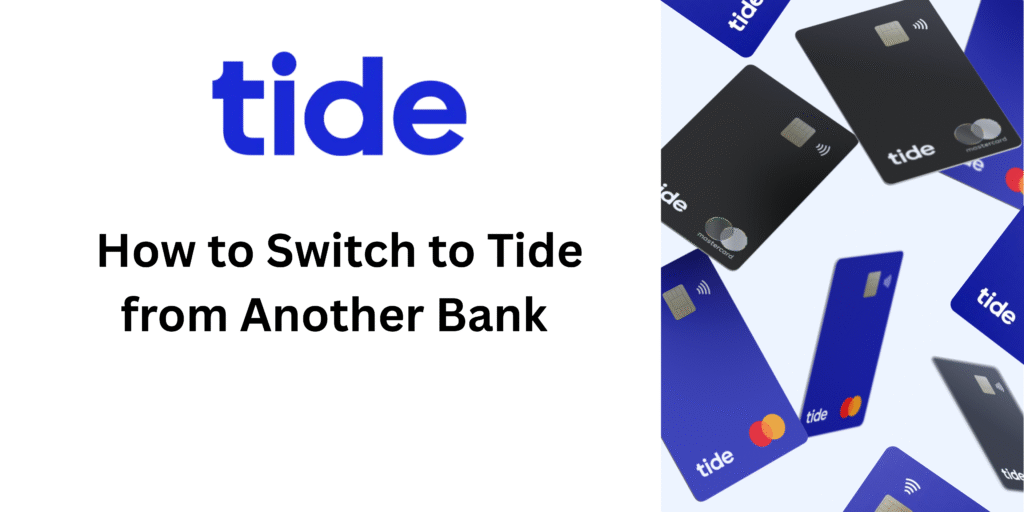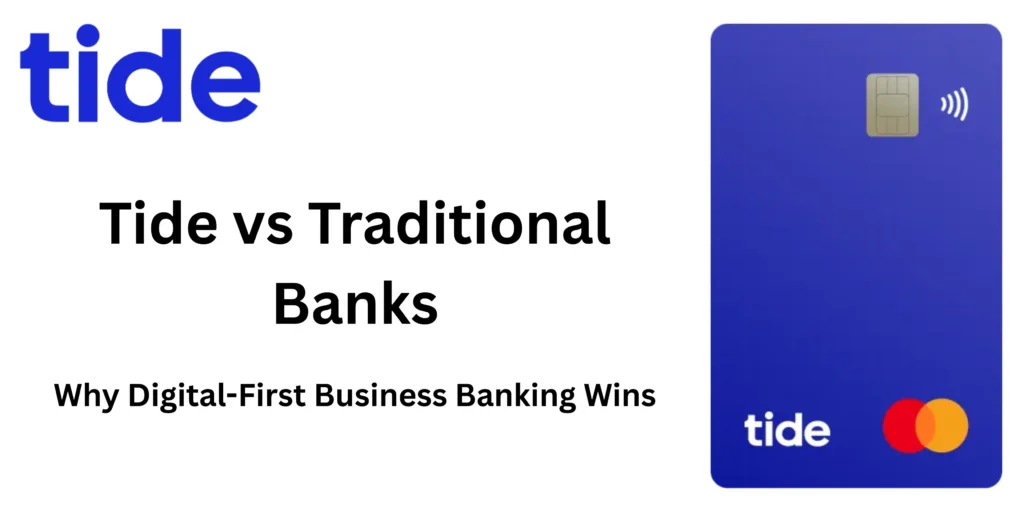
Introduction
For sole traders, SMEs, and UK startups in 2026, choosing the right business bank account can feel like a pivotal decision. Traditional high street banks have long been the default option, offering familiar branch-based services and name recognition. Yet, the financial landscape has shifted dramatically, with digital-first challengers like Tide transforming how small businesses manage their money.
This article explores the debate of Tide vs Traditional Banks, giving you a clear, evidence-based review of what digital banking offers compared to the old high street model. We’ll unpack account features, fees, ease of use, integrations, customer service, and more—providing a comprehensive Tide digital banking review so you can decide with confidence.
If you’re a sole trader or SME looking for agility, cost savings, and better financial tools, Tide offers significant advantages. Plus, by signing up with promo code STARTUP200, new users can currently claim up to £200 cashback (subject to eligibility).
👉 Open your Tide Business Account today and get up to £200 cashback with STARTUP200account today using promo code STARTUP200 and unlock up to £200 cashback.
Contents
- The Rise of Digital-First Business Banking
- Tide vs High Street Banks: Core Differences
- A Full Tide Digital Banking Review
- Ease of Setup and Account Management
- Features That Matter to SMEs
- Tide Bank Comparison: Fees and Pricing
- Integrations and Tools for Business Growth
- Customer Support: Tide vs Traditional Banks
- Security and Trust in Digital Banking
- Step-by-Step: How to Open a Tide Business Account
- Promotion Conditions Explained (£200 Cashback)
- Tide for SMEs: Real-World Use Cases
- General FAQs
- Recap
- Conclusion
The Rise of Digital-First Business Banking
Over the past decade, UK banking has undergone a profound transformation. Challenger banks and fintech platforms have disrupted the status quo by offering services built for the mobile-first, digital-native generation of entrepreneurs.
Unlike traditional banks, which often rely on legacy systems, digital-first providers like Tide leverage cloud-based infrastructure, API connectivity, and app-driven user experiences. This makes them faster to innovate, more responsive to SME needs, and capable of delivering lower-cost services.
The 2026 SME economy is leaner, more agile, and heavily digitalised. Many sole traders and startups no longer see the value in maintaining a relationship with a bricks-and-mortar branch. Instead, they prefer a platform that allows them to open accounts quickly, integrate with their accounting software, and manage everything via smartphone.
In this environment, Tide has emerged as a leading choice for SMEs, not only offering current accounts but also tools to help manage invoicing, expenses, and tax planning.
👉 Join the digital banking movement with Tide and claim £200 cashback using STARTUP200 business account today using promo code STARTUP200 and unlock up to £200 cashback.

Tide vs High Street Banks: Core Differences
When comparing Tide vs High Street Banks, several core differences stand out:
- Account Opening Speed: High street banks can take days or even weeks, requiring branch visits and paperwork. Tide accounts are typically opened in minutes via the app.
- Branch Access: Traditional banks rely on physical branches, whereas Tide operates entirely online—ideal for digital-savvy businesses.
- Fees: Tide offers transparent, lower-cost monthly plans, while traditional banks often bundle fees for services like overdrafts, international payments, or cash deposits.
- Tools and Integrations: Tide integrates seamlessly with accounting platforms like Xero, QuickBooks, and Sage, streamlining bookkeeping. Traditional banks often lack these integrations.
- Customer Support: While high street banks offer face-to-face support, Tide provides in-app chat support and an extensive knowledge base, which many SMEs find more accessible.
Ultimately, the comparison highlights convenience and flexibility versus tradition and familiarity.E account today with code STARTUP200 and unlock up to £200 cashback.

A Full Tide Digital Banking Review
A Tide digital banking review shows how the platform goes beyond a simple business current account. Tide is designed specifically for SMEs, freelancers, and startups, offering:
- Fast signup with digital verification.
- Multiple accounts for managing separate income streams.
- Expense management tools with auto-categorisation.
- Invoice creation and tracking directly from the app.
- Tax calculation support, reducing end-of-year stress.
- Debit cards for team members, allowing controlled spending.
Compared with traditional banks, which often offer generic current accounts with limited extras, Tide provides features SMEs actually use on a daily basis.s for your business? Open your Tide SME account today with promo code STARTUP200 and get up to £200 cashback.
Ease of Setup and Account Management
Opening a Tide account is designed to be frictionless. Sole traders can apply using just their ID and proof of address, while limited companies can be verified instantly against Companies House records.
By contrast, opening a business account with a high street bank typically requires:
- In-person branch visits.
- Extensive paperwork.
- Longer waiting times (often 1–3 weeks).
Once active, Tide accounts are managed entirely through the mobile or web app. Everything—payments, invoicing, statements—is centralised in one dashboard. For busy entrepreneurs, this means less time spent on admin and more time growing the business.ht one for your business — open your Tide account today with code STARTUP200 and receive up to £200 cashback.
Features That Matter to SMEs
Tide was built with SMEs in mind, so the features reflect common pain points:
- Instant transaction notifications keep you on top of cash flow.
- Direct debit and standing order setup for recurring payments.
- Access to business loans and credit via partners.
- Expense categorisation aligned with HMRC tax codes.
- Exportable statements ready for accountants.
- Multiple user access, allowing teams to share responsibility.
For SMEs, these tools make a significant difference compared with the limited, generic offerings of high street banks.
👉 Experience SME-friendly features with Tide and get £200 cashback using STARTUP200
Tide Bank Comparison: Fees and Pricing
One of the most compelling aspects of a Tide bank comparison is pricing transparency.
- Tide Free Account: No monthly fees, pay-as-you-go charges on certain transactions.
- Tide Plus (£9.99/month): Includes 20 free transfers, priority support, and a legal helpline.
- Tide Pro (£18.99/month): Unlimited free transfers and exclusive perks.
- Tide Cashback (£49.99/month): 0.5% cashback on all card purchases, ideal for higher spenders.
Traditional banks often charge fixed monthly account fees (£6–£12) with additional costs for transfers, international payments, or overdraft facilities.
The key difference is flexibility. Tide allows SMEs to pick a plan that matches their usage, avoiding hidden charges.
Integrations and Tools for Business Growth
Beyond banking, Tide offers integrations that help SMEs grow:
- Accounting Software: Syncs with Xero, QuickBooks, FreeAgent, and Sage.
- Payment Solutions: Integration with Stripe, PayPal, and GoCardless.
- Tax and VAT tools: Automated tracking for HMRC compliance.
- Company Formation: Register a limited company through the app.
This positions Tide as not just a bank but a business growth partner. High street banks rarely offer this level of integration.
Customer Support: Tide vs Traditional Banks
Customer service is another area where SMEs notice a difference.
- Tide Support: In-app chat, 24/7 self-service resources, and email support. Priority phone support is available on paid plans.
- Traditional Banks: Branch service, call centres, and relationship managers for larger clients.
For digital-first entrepreneurs, the convenience of in-app support is often preferable to waiting in line at a branch or spending time on hold.
Security and Trust in Digital Banking
Security is paramount for SMEs, and Tide is fully regulated:
- FCA-regulated (Financial Conduct Authority).
- Funds safeguarded in regulated accounts (not covered by FSCS but kept separate from Tide’s own funds).
- Biometric logins and real-time fraud monitoring.
While traditional banks benefit from long-standing reputations and FSCS protection, Tide has invested heavily in digital security, offering SMEs confidence in their daily banking.
Step-by-Step: How to Open a Tide Business Account
Opening a Tide account is straightforward. Here’s the process:
- Download the Tide app (iOS or Android).
- Register your business type (sole trader or limited company).
- Upload your ID (passport or driving licence).
- Verify your address (utility bill, bank statement, or digital check).
- Sync with Companies House (for limited companies).
- Receive your debit card in the post (typically within 3–5 working days).
- Start transacting immediately once your account is approved.
Total setup time? Often under 15 minutes—far quicker than traditional banks.
👉 Open your Tide account in minutes and claim £200 cashback with STARTUP200
Promotion Conditions Explained (£200 Cashback)
The current Tide £200 cashback offer works as follows:
- £75 cashback once you spend £100 on your Tide card within 30 days.
- Additional £125 cashback if you deposit and hold at least £5,000 in a Tide Instant Saver for 30 days.
Promo Code: STARTUP200
Offer validity: Subject to eligibility; terms may change. Always check Tide’s latest T&Cs before applying.
This is one of the most generous cashback offers currently available for SME business banking in the UK.
Tide for SMEs: Real-World Use Cases
SMEs across the UK use Tide for:
- Freelancers: Managing client invoices, tracking expenses, and separating personal from business finances.
- Retailers: Accepting payments and managing supplier transactions.
- Consultants: Linking banking with accounting tools for seamless bookkeeping.
- Startups: Quickly opening accounts without delays that can stall operations.
By focusing on practical, time-saving tools, Tide has become a go-to solution for SMEs who value agility and transparency.
General FAQs
Is Tide a real bank?
Tide is not a bank in the traditional sense but an FCA-regulated e-money institution that provides business current accounts and financial tools tailored to SMEs. Unlike high street banks, Tide holds customer funds in safeguarded accounts with regulated banking partners, meaning your money is ring-fenced and protected, though not under the FSCS scheme. In a Tide bank comparison, it’s important to note that while Tide doesn’t have branches, it offers digital-first features designed specifically for sole traders and SMEs. This distinction is at the heart of the Tide vs traditional banks debate—choosing between physical branches or flexible, app-based banking.
What is the difference between Tide vs Traditional Banks?
The difference between Tide vs traditional banks is stark. Traditional high street banks rely on in-branch appointments, slower account opening processes, and legacy systems. Tide, by contrast, allows sole traders and SMEs to open an account in minutes, manage finances entirely via app, and access powerful tools like invoicing, expense tracking, and accounting integrations. In our Tide digital banking review, we found that these features save entrepreneurs hours every week compared with high street banks. Ultimately, when you compare Tide vs high street banks, Tide offers agility and modern tools, while traditional providers offer stability and face-to-face interactions.
Can I get cashback with Tide?
Yes. Tide offers one of the UK’s best business banking promotions, with up to £200 cashback when using promo code STARTUP200. The offer is split into two stages: you receive £75 cashback after spending £100 within the first 30 days of opening your account, and an extra £125 if you deposit £5,000 into a Tide Instant Saver account and hold it for 30 days. This makes Tide especially attractive for startups looking to cut costs when managing their finances. Compared with traditional banks, which rarely offer new account cashback, Tide is a clear winner in any Tide bank comparison.
How long does it take to open a Tide account?
Opening a Tide account is significantly faster than opening one with a high street bank. Most customers can complete the process in 10–15 minutes entirely online, thanks to Tide’s digital verification and integration with Companies House for limited companies. In contrast, traditional banks may take one to three weeks, often requiring in-person branch visits. For time-pressed entrepreneurs, freelancers, and SMEs, the difference is decisive. This speed is a major reason why Tide vs traditional banks is such a relevant question for startups in 2026. A Tide digital banking review consistently shows account setup as one of its standout advantages.
Does Tide integrate with Xero or QuickBooks?
Yes. Tide integrates directly with popular accounting platforms including Xero, QuickBooks and Sage. This makes bookkeeping far more efficient, as transactions automatically sync, expenses can be categorised, and VAT calculations become smoother. In a Tide bank comparison, this functionality gives Tide a huge advantage over traditional banks, which often lack deep integrations with SME accounting tools. For sole traders and SMEs juggling tax obligations, this feature reduces admin time and lowers the risk of costly mistakes. Our Tide digital banking review consistently highlights these integrations as a key reason why SMEs prefer Tide over high street banks.
Is Tide good for freelancers?
Absolutely. Freelancers often struggle with separating personal and business finances, invoicing clients, and keeping on top of expenses. Tide was designed for exactly these challenges. With instant notifications, invoicing tools, and easy expense categorisation, freelancers can manage their finances in one app without the complexity of a traditional bank account. Compared with tide vs high street banks, freelancers report Tide feels more aligned to their day-to-day needs. In practice, a freelancer might use Tide to send invoices, track who has paid, and automatically feed data into Xero or QuickBooks. This makes Tide an ideal banking solution for the gig economy.
Do I need a business bank account as a sole trader?
Legally, sole traders in the UK are not required to open a separate business bank account. However, it is highly recommended for clarity and professionalism. Using Tide allows sole traders to separate business and personal transactions, simplify tax returns, and project a more professional image to clients. In comparing tide vs traditional banks, Tide’s quick setup and SME-focused tools give sole traders a stronger advantage than generic current accounts from high street providers. Many freelancers find that Tide’s expense tracking and invoicing tools replace the need for additional software. This makes Tide a smart choice for sole traders in 2026.
Is the £200 cashback guaranteed?
The £200 cashback offer with Tide is not automatic but based on meeting specific conditions. New customers must use promo code STARTUP200 when signing up. You’ll receive £75 after spending £100 on your Tide card within 30 days, and the remaining £125 if you hold at least £5,000 in an Instant Saver for 30 days. Compared to traditional banks, which rarely provide direct cashback incentives, this is one of the best deals available for SMEs. Always check Tide’s terms and conditions, as offers are subject to change. Still, in a Tide bank comparison, this promotion is a major differentiator.
Can I use Tide abroad?
Yes. Tide provides Mastercard debit cards that can be used internationally, making it convenient for SMEs that travel or pay suppliers abroad. However, certain transaction fees may apply, particularly for non-GBP payments. This is similar to most traditional banks, though Tide’s transparency often makes costs easier to anticipate. For startups working with international clients or suppliers, the ability to use Tide globally is important. In a Tide digital banking review, international usability scored highly, particularly when compared with smaller high street banks that don’t prioritise global SME needs.
Does Tide offer overdrafts?
Tide does not currently provide traditional overdrafts in the way high street banks do. However, it partners with specialist lenders to give SMEs access to credit and business loans. This reflects the wider difference in tide vs traditional banks—while high street providers rely on legacy lending models, Tide connects businesses to digital finance partners more flexibly. In practice, this means SMEs can access short-term funding without the lengthy application processes often associated with traditional banks. While this might not suit all businesses, it’s a good option for startups seeking quicker funding pathways.
Is my money safe with Tide?
Yes, your money is safe with Tide. Although Tide is not covered by the Financial Services Compensation Scheme (FSCS), it safeguards all customer funds in separate regulated accounts with UK banking partners. This ensures your money is ring-fenced and cannot be used for Tide’s own operations. From a Tide digital banking review perspective, this approach gives SMEs confidence while reflecting the innovative, digital-first model Tide represents. Traditional banks, by contrast, rely on FSCS for protection. Both models are safe but operate differently, which is important to consider in any Tide vs traditional banks comparison.
How do I use the promo code STARTUP200?
To activate the £200 cashback offer, simply apply for a Tide Business Account via this affiliate link and enter promo code STARTUP200 during the signup process. Once you’ve opened your account and met the spending and deposit conditions, the cashback will be credited automatically. In a Tide bank comparison, this promotion is one of the most attractive incentives on the market in 2026, especially for SMEs starting out. Traditional banks rarely provide such cashback offers, making Tide’s bonus a strong reason to switch.
Can I deposit cash with Tide?
Yes. Tide allows customers to deposit cash at Post Office branches and PayPoint locations across the UK. While fees apply, this provides a nationwide solution for businesses that still handle cash. Traditional high street banks typically offer free or lower-cost cash deposits, which may be better suited for cash-heavy businesses. However, many modern SMEs operate mostly cashless, so Tide’s arrangement works well. In the tide vs high street banks debate, this is one area where traditional providers still have an edge, but for digital-first SMEs, it’s rarely a dealbreaker.
Who is Tide best for?
Tide is best suited to SMEs, freelancers, and startups that want digital-first convenience, flexible account tiers, and powerful integrations. It excels for entrepreneurs who prefer mobile and web-based banking rather than traditional branch access. In our Tide digital banking review, SMEs consistently praised Tide’s fast setup, invoicing features, and tax support tools. A Tide bank comparison shows that while high street banks may appeal to businesses needing overdrafts or face-to-face service, Tide is the clear winner for modern, digital-savvy SMEs. This makes Tide the go-to choice for startups in the UK’s evolving business landscape.
Recap: Is Tide Right for Your SME?
The debate of Tide vs Traditional Banks highlights a clear trend: SMEs in 2026 want speed, flexibility, and transparency. While high street banks remain an option, their slow processes and outdated systems put them at a disadvantage compared with digital-first providers like Tide.
With easy account setup, powerful SME features, seamless integrations, and one of the UK’s best cashback offers, Tide continues to outshine its traditional counterparts.
Conclusion & £200 Cashback Offer
For sole traders, startups, and SMEs, the choice between Tide vs Traditional Banks comes down to priorities. If you want branch access and FSCS protection, a high street bank might still appeal. But for most small businesses operating in a digital-first economy, Tide offers unbeatable convenience, cost savings, and growth-focused tools.
With features designed for SMEs, lightning-fast setup, and integrations that save hours of admin, Tide represents the future of business banking in the UK. And with the exclusive £200 cashback offer using promo code STARTUP200, there’s never been a better time to switch.
👉 Open your Tide Business Account today and claim up to £200 cashback with STARTUP200
Disclaimer: Offers subject to eligibility. Cashback and terms may change. Always check the latest details on Tide’s official site before applying.
- How to Switch to Tide from Another Bank in 2026Introduction Making the decision to change your business bank account can feel daunting, but in 2026 it’s easier than ever to move from your old provider to a modern, digital-first bank like Tide. Whether you’re a sole trader, a limited company director, or running a growing SME, understanding how to switch to Tide will help… Read more: How to Switch to Tide from Another Bank in 2026
- Best Digital Business Bank Accounts in the UK – Where Tide Fits InIntroduction For sole traders, SMEs, and ambitious startups across the UK, digital banking has become an indispensable tool in 2026. The days of standing in line at a branch, juggling paperwork, or waiting weeks for account approval are long gone. Today, with just a few taps on your smartphone or a few clicks on your… Read more: Best Digital Business Bank Accounts in the UK – Where Tide Fits In
- Tide’s Smart Features That Help Grow Your Business in 2026Introduction For sole traders, SMEs, and UK startups, managing money is often one of the toughest parts of running a business. From keeping receipts in order and chasing unpaid invoices to paying suppliers and filing taxes, financial admin can eat into the hours you’d rather spend building your venture. This is where digital-first banking solutions… Read more: Tide’s Smart Features That Help Grow Your Business in 2026
- Why Sole Traders Choose Tide for Flexibility and SimplicityIntroduction For thousands of sole traders across the UK, finding a bank that understands the realities of self-employment is no easy task. Traditional high-street banks can feel outdated, slow, and overly complex. This is where Tide for sole traders has stepped in to change the game. Since launching, Tide has attracted freelancers, contractors, and small… Read more: Why Sole Traders Choose Tide for Flexibility and Simplicity
- How Tide Helps Startups Save Time & Money with Smart BankingIntroduction Starting a business in the UK is an exciting but often overwhelming journey. Founders must juggle everything from company registration and compliance to marketing and sales. Amidst this whirlwind, one of the most important decisions you will make is choosing the right banking partner. In 2026, digital-first providers have become the go-to option for… Read more: How Tide Helps Startups Save Time & Money with Smart Banking
- 10 Hidden Benefits of Tide Business Accounts You Need to KnowIntroduction Choosing the right business bank account is one of the most important early decisions for sole traders, freelancers, and startups. The right account should not only help you manage money but also save time, reduce admin, and offer perks that actually matter to small businesses. For UK entrepreneurs in 2026, Tide Business Accounts have… Read more: 10 Hidden Benefits of Tide Business Accounts You Need to Know
- Tide vs Traditional Banks: Why Digital-First Business Banking WinsIntroduction For sole traders, SMEs, and UK startups in 2026, choosing the right business bank account can feel like a pivotal decision. Traditional high street banks have long been the default option, offering familiar branch-based services and name recognition. Yet, the financial landscape has shifted dramatically, with digital-first challengers like Tide transforming how small businesses… Read more: Tide vs Traditional Banks: Why Digital-First Business Banking Wins
- Tide Business Banking for SMEs – Features, Pricing & SupportIntroduction Running an SME or SME startup in the UK is exciting — but it also comes with challenges. One of the most important early decisions you’ll make as a business owner is how to manage your company’s finances. From day-to-day cash flow and payroll to paying suppliers and filing taxes, your banking setup can… Read more: Tide Business Banking for SMEs – Features, Pricing & Support
- Ultimate Tide Business Account Review 2026 – – Features, Pricing & SetupIntroduction Choosing the right business bank account can make or break your financial management as a startup, sole trader, or SME. With so many challenger banks and fintech platforms now available in the UK, it’s not always easy to know which option is best. That’s why we’ve created this in-depth Tide Business Account Review 2026… Read more: Ultimate Tide Business Account Review 2026 – – Features, Pricing & Setup


















